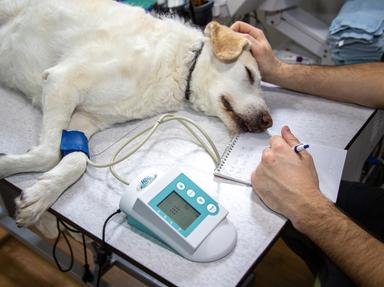Quiz Answer Key and Fun Facts
1. Your toy poodle, Prissy, seems to hop or skip when she walks or runs. It would almost be cute, except it seems to cause her pain at times. You take her to the vet for a consultation.
How does your vet characterize Prissy's malady?
2. Poor little Prissy, your female toy poodle, is urinating all the time. She also whimpers when she has to pee, and licks her private parts incessantly. You take her back to the vet.
How does the vet explain what is wrong with Prissy now?
3. When your little poodle Prissy was just a puppy and was teething, you used to call her your little "vacuum cleaner" because she would chew on everything. Your furniture, shoes, books, anything you left around could be her next chew toy! You had to take her to the vet around this time once, though, because she was vomiting and seemed extremely uncomfortable. Also, she didn't want to eat anymore and wasn't able to poo either.
How did the vet explain what was going on with Prissy this time?
4. You are off to the vet again with your poor little poodle Prissy. She starts off vomiting, and you wonder what she has gotten into. Then she has diarrhea and seems restless and desperate. When she starts having tremors and her heart is racing, you rush her to the vet.
How does the vet characterize what has happened to Prissy?
5. It's off to the vet with your normally pretty poodle pup, Prissy. All of a sudden she's been losing patches of her fur. You have examined her and you don't see any bugs on her, but she definitely has a problem.
How does the vet describe what Prissy is suffering from this time?
6. Oh no. Something is wrong with your pretty little poodle, Prissy. She is scratching constantly, she's losing her fur, and her skin has gotten scaly, flaky and peeling. She even has sores where she's lost her fur, and they have a bad odor. You go to the vet.
How does the vet tell you what is going on with your dog now?
7. Something is off with your miniature poodle, Prissy. She has started bumping into things. At first you notice it mostly at night, when Prissy seems to trip on steps and fall into holes. Now, you see that she often refuses to go outside on bright sunny days too. You take her to the vet to see what the trouble is.
How does your vet break the news to you about Prissy's problem?
8. Poor Prissy! Your sweet little toy poodle has started to tear-up a lot, and she has a funny discharge coming from her eyes. Her eyes are really red, and it looks like she's been crying. You trot off to the vet once more.
How does he explain the problem with Prissy's eyes?
9. Your poodle Prissy seems to have a problem. She is shaking her head a lot, and rubs the side of her head and face on the sofa and furniture. When you scratch her head, she sometimes yelps and doesn't appear to want you to touch her. You go to the vet right away.
How does the vet tell you what is going on with Prissy?
10. Something's up with your poor dog Prissy. She just seems to be out of sorts. She doesn't want to eat. She is lethargic. She sometimes vomits up bile. You are worried about her, and when her eyes turn yellow, you go to the vet.
How does the vet describe what Prissy is suffering from this time?
Source: Author
shuehorn
This quiz was reviewed by FunTrivia editor
rossian before going online.
Any errors found in FunTrivia content are routinely corrected through our feedback system.

